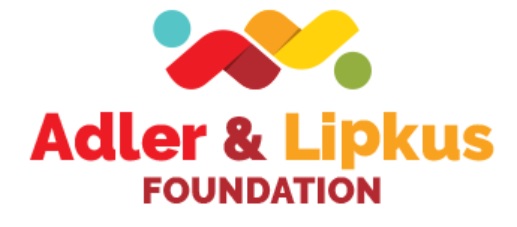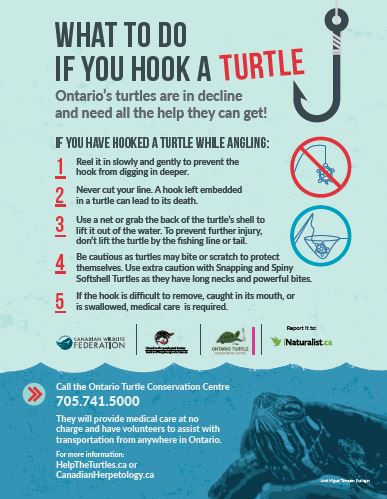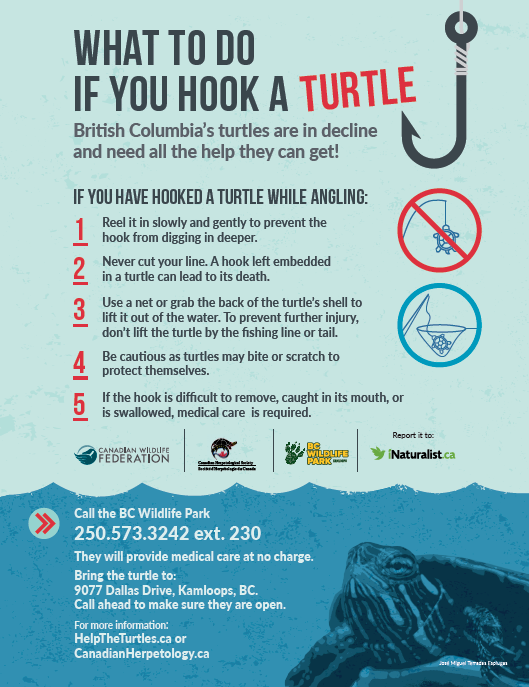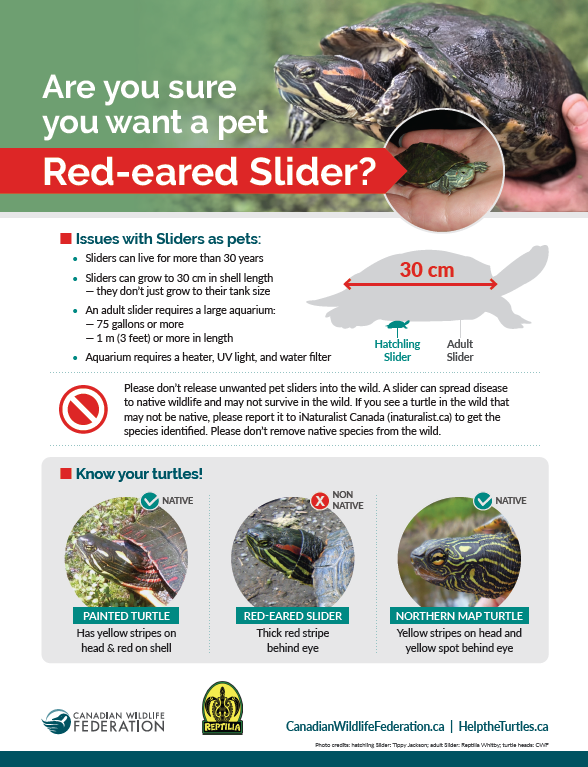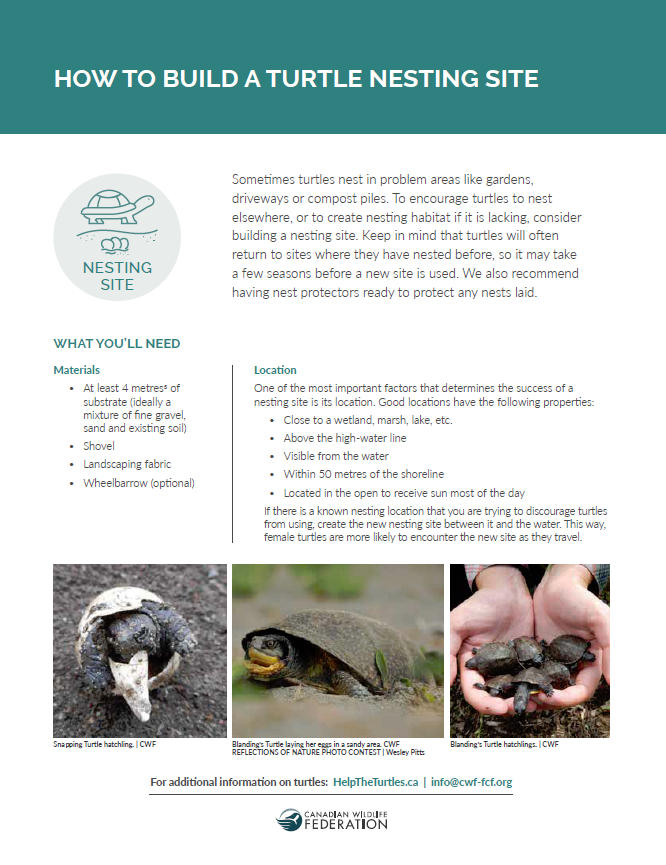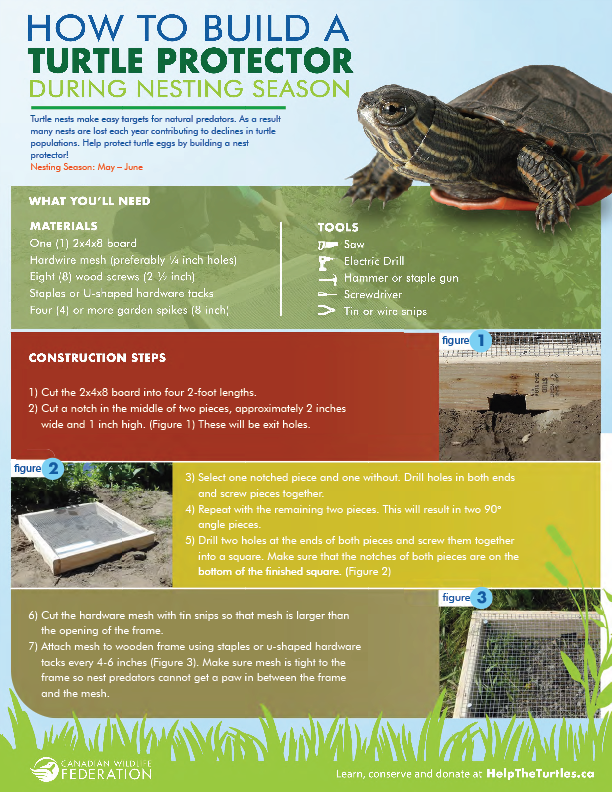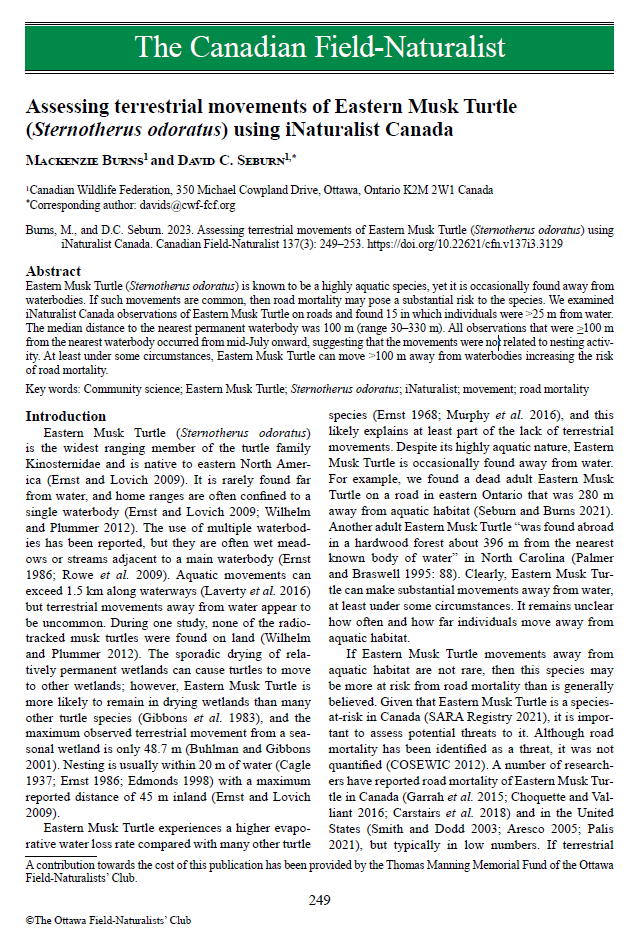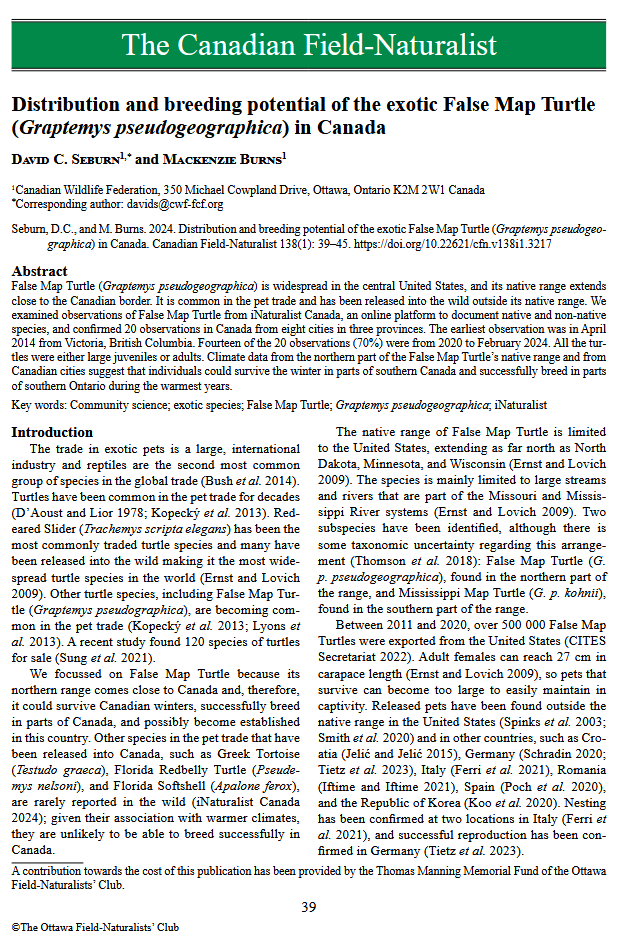Why Are Turtles At Risk?
Freshwater turtles are one of the most endangered groups of animals in Canada. The main threats to freshwater turtles in Canada are:
- Road mortality
- Habitat loss
- Nest predation
- Poaching for the pet trade
Currently all eight species of freshwater turtles in Canada have been designated species at risk by the federal government. But the Canadian Wildlife Federation believes that we can help conservation efforts for these at-risk species. We are working with partners and landowners, the government and YOU to move forward in helping freshwater turtles in Canada.

Goal of the Program
The Canadian Wildlife Federation continues to work with regional partners, community groups, lake associations and individuals to reduce risks to turtles. Our goal is to ensure the long-term survival of turtle populations by focusing on three key priorities:
1) Protecting wetland habitat
2) Decreasing road mortality
3) Increasing hatchling survival

Active Turtle Projects
Eastern Ontario Turtle Project
The CWF Eastern Ontario Turtle Project continues to work in the greater Ottawa area.
Past Turtle Project: Scales Nature Park Central Ontario Turtle Project >
Did You Know?
4,200
Number of turtles in the Ottawa and Muskoka area found dead on roads from 2017 – 2021
4,010
km2 area of wetland habitat protected in Muskoka and Ottawa area as a direct result of this program.
76,000
Number of hatchlings CWF and partners released back into the Ontario wild after incubation.
The Road to Recovery — Turtles and Road Mortality
Loss of wetland habitats and the convenience offered by soft shoulders adjacent to roadways means more turtles are nesting in high-risk areas. This is a major reason for the increase in road mortality affecting Canada’s turtle populations. Here are some ways you can help reduce the number of turtles being killed or injured along roadways each year:
Learn How to Help a Turtle Cross the Road
It is important to know when a turtle needs help and when it does not.
During late May and June, many turtles are crossing roads to find a place to lay their eggs. Those turtles need a turtle hero to move them safely off the road.

How to tell if a turtle needs rescuing
- It is unresponsive (it can be hard to determine if a turtle has died so err on the side of caution)
- It has head or limb injuries, or cracks to its shell
- It is found upside down and is unable to right itself, which may indicate dehydration and overheating
How to Help an Injured Turtle
If you have found a turtle hit by a vehicle, do not assume it is dead even if it is unresponsive. Turtles can survive major injuries. Aside from Snapping Turtles, most turtle species can be carefully picked up with two hands at the sides of their shell.
- Place the turtle on a damp towel in a well-ventilated plastic bin with a secure lid. Do not provide any food or water.
- Keep the container in a dark, quiet place away from people and pets. Do not provide any additional heat source for the turtle.
- Contact a rehab centre for advice as soon as possible.


Hooking a Turtle While Angling
Another widespread threat is the accidental hooking of turtles on fishing lines. Many freshwater turtles are vulnerable to getting caught on baited fishing hooks. Often anglers will simply cut the fishing line, so the hook remains caught in the turtle.
If you are in one of the following provinces and hook a turtle call the provided phone number. Each agency will provide medical care to injured turtles at no charge and may be able to arrange transportation for the turtle. Keep the phone number in your tackle box in case you hook a turtle. For other provinces check for wildlife rehabilitation centres that work with turtles.
- British Columbia:
Vancouver Island: MARS Wildlife Rescue Centre (250) 337-2021 or BC SPCA Wild Animal Rehabilitation Centre (855) 622-7722
Lower Mainland: Wildlife Rescue Association (604) 526-7275
Interior BC: BC Wildlife Park (Kamloops) (250) 573-3242 - Manitoba: Wildlife Haven Rehabilitation Centre (204) 878-3740
- Ontario: Ontario Turtle Conservation Centre (705) 741-5000
- Quebec: Parc de la Rivière-des-Mille-Îles (450) 622-1020 ext. 286
- Atlantic Canada: Atlantic Wildlife Institute (506) 364-1902
Turtle Species in Canada
Learn about the eight native and one exotic species of freshwater turtles found in Canada, as well as the Leatherback Seaturtle.

What You Can Do
Leave fallen trees and branches in place along shorelines
Turtles use these as a platform for basking in the sun. If there aren’t any, you could even place some logs to give them a spot to bask.
Slow Down!
Drive safely and slow down when approaching areas where wetlands are close to the road. This will give you enough time to safely avoid a turtle.
In the News
-
How Do Freshwater Turtles Survive a Canadian Winter?
January 3, 2022 - Many birds fly south to avoid the long, cold Canadian winter. Turtles don’t have that option.
-
How Do Freshwater Turtles Survive a Canadian Winter?
January 3, 2022 - Many birds fly south to avoid the long, cold Canadian winter. Turtles don’t have that option.
-
How we can help Canada's at-risk turtles survive and thrive
July 2, 2022 - Slow and steady may help turtles win the race to find the perfect nesting site to breed, but humans have a vital role in ensuring they reach that finish line. With summer here, turtles are more mobile now as they search for partners and ideal grounds to lay their eggs.
-
The Next Extinction Level Event — Is It Already Here?
January 24, 2019 - Are we witnessing a mass extinction?
-
How we can help Canada’s endangered turtles survive and thrive
May 23, 2023 - Slowly and steadily, turtles can help win the race to find the perfect nesting site to breed, but humans play a crucial role in ensuring they reach the finish line.
-
Here Are the Most Dangerous Roads in Eastern Ontario
June 4, 2019 - Turtles and roads are a dangerous combination.
Papers & Handouts
Related Resources

Program Lead
David Seburn
David Seburn is the Freshwater Turtle Specialist at the Canadian Wildlife Federation. David has worked on amphibian and reptile conservation for more than 20 years. He has written status reports, recovery strategies and more than a dozen scientific papers on amphibians and reptiles, radio-tracked turtles through swamps, and spoken to hundreds of people about turtle conservation. In 2020, he was presented with the Blue Racer Award from the Canadian Herpetological Society for significant contribution to the conservation of Canadian amphibians and reptiles.
“Turtles are so amazing! They have been around since the time of the dinosaurs. Now all of Canada’s species of freshwater turtles are at risk. We can all do our part to help the turtles.”

You Can Always Help
by Adopting-an-Animal!
Painted Turtles are the most widespread freshwater turtle in Canada. In most of Canada, Painted Turtles are not listed as at risk under the Species at Risk Act, however the Pacific Coast population is considered Endangered and the Intermountain population is listed as of Special Concern. These turtles face many threats including habitat loss and road mortality. When you buy this Adopt-an-Animal, all funds go to help conservation of freshwater turtles in Canada.
Sign Up for Timely Articles and Tips
Join Canadian Wildlife Federation's online community of supporters to get access to special features and exclusive e-mail updates and offers for free!
The Canadian Wildlife Federation is grateful to the following organizations for financial support for our turtle conservation work.
